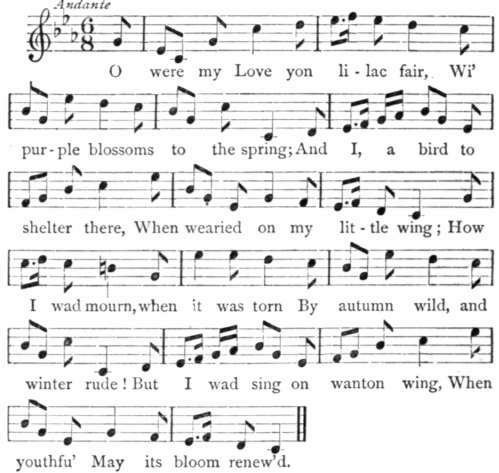Когда б, как нежная сирень (Бернс/Смирнов)
| Когда б, как нежная сирень , пер. Д. Смирнов-Садовский (р. 1948) |
| Язык оригинала: шотландский. Название в оригинале: O Were My Love Yon Lilac Fair. — Опубл.: 1793 (перевод). Источник: http://www.robertburns.org/works/340.shtml |
1793.
Перевод: 1 октября 2009, Сент-Олбанс |
1793
|
Примечания
Только первые восемь строк принадлежат Бернсу. Другие восемь строк – оригинальное анонимное стихотворения. Вкладывая то и другое в письмо от 25 июня 1793 года, Бернс писал, о тексте анонимного стихотворения: «Мысль его невероятно красива, и достаточно, насколько я знаю, оригинальна. Стихотворение слишком коротко для песни... Я много раз пытался добавить ещё одну строфу, но безрезультатно. Раскачиваясь в своем кресле в течение пяти минут, я произвёл следующее: [первые 8 строк] – строки, я должен откровенно признаться; сильно уступающие тем, что уже были, но если они достойны печати, пусть они будут в начале, ибо каждый поэт, понимающий в этом деле, сбережёт лучшие мысли для заключительного удара». Томсон предложил «Хьюи Грэм» ("Hughie Graham") в качестве мелодии, и пока Бернс размышлял, подходит она к стихам или не нет, Томсон переделал по-своему и стихи и музыку, подключив к этой работе, по крайней мере, пять дополнительных авторов. Здесь же в основу перевода, положен текст очищенный от редакторских наслоений.
Мелодия:
Приложение
Page 401. II. LOVE-SONGS : GENERAL
No. 146. O, were my love yon lilac fair. Currie, Works, 1800, iv. 76. Scotish Airs, 1805,154. The MS. is at Brechin Castle. Only the first eight lines are the work of Burns. Enclosing the poem iu a letter of June 25, 1793, Burns writes thus: ' The thought is inexpressibly beautiful, and quite, so far as I know, original. It is too short for a song, else I would forswear you altogether, except you give it a place. I have often tried to eke a stanza to it, but in vain. After balancing myself for a musing for five minutes on the hind-legs of my elbow-chair, I produced the following. [That is, the first eight lines in the text.] The verses are far inferior to the foregoing [The fragment— the last eight lines], I frankly confess; but, if worthy of insertion at all, they might be first in place, as every poet, who knows anything of his trade, will husband his best thoughts for a concluding stroke.' This little lyric was dreadfully mutilated by the editor. Thomson suggested Hughie Graham as the tune, and while Burns agreed that the measure would suit, he was doubtful whether it would properly express the verses. The poet was evidently not familiar with the proper tune, and modelled his stanza from the fragment which he got from Herd's Scottish Songs, illd, ii. 4.
Thomson's Imprint was a curious piece of patchwork; at least five authors were represented in the poetry and music. In his Select Melodies, 1825, vi.j2, the poetry is in three stanzas : the first by Burns as in the text, the second by a Mr. Richardson, and the third is the anonymous original. As to the melody —an imitation of that in the text—the first part is the composition of a lady correspondent, the second part is the work of the editor.
Another old song of three stanzas on the threadbare theme is in the Herd MS., and the middle one runs as follows :—
|
The song has rarely been printed with its proper melody. In the Scots Musical Museum, 1803, No.jp^, it is set to Lord Balgonie's favourite, now better known as Gloomy winter's noo awa, probably because the proper tune had been appropriated to another song in the volume, beginning,' Gently blaw, ye western breezes.'
A bad setting of the proper tune, Gin my love were yon red rose, is in Macfarlan MS, 1740, entitled Under her apron; and in the Scots Musical Museum, 1803, No. J62.
Source: «traditionalmusic.co.uk»
© D. Smirnov-Sadovsky. Translation. Can be reproduced if non commercial. / © Д. Смирнов-Садовский. Перевод. Комментарий
| Это произведение опубликовано на Wikilivres.ru под лицензией Creative Commons |

